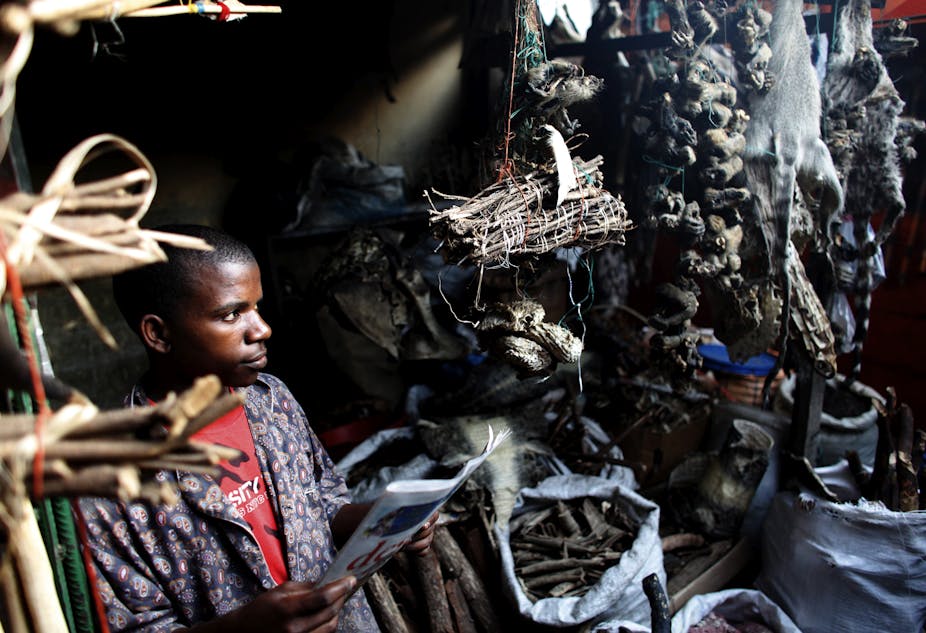Is indigenous knowledge important in education? Can it be discussed in the formal science curriculum?
I posed this question to university foundation students for a research project into place-based science learning. The group of about 18 isiZulu-speaking students told me one after the other that their “local knowledge” was irrelevant. No, they weren’t interested in traditional ways of knowing. Their grandparents may have had “indigenous knowledge”, but this wasn’t for them.
Sipho was the last to join the conversation. He laughed: “They are all lying!” But his voice was bitter and sad. His comment provoked uneasy laughter and took the discussion in a new direction. One young man explained that he had given me what he thought would be an acceptable answer. Others now said: “Yes, sure, of course – I mean, we know things differently” and “We have one way of knowing at home and another at school.”
An example:
The science teacher explains how lightning works – charges and all that – but she doesn’t explain why one particular person got struck and not the person next to them.
Teachers can’t explain this phenomenon – and some people claim it’s witchcraft at work. Teachers avoid the topic altogether, which frustrates their learners.
There is also a tendency for some indigenous knowledge system researchers - and many teaching materials on the subject – to only extract the “safe” bits of this kind of knowledge. There’s no mention of tricky issues that might force the teachers to acknowledge another world view.
Absence of materials, teachers’ reluctance
Indigenous knowledge includes a local community’s traditional technology; social, economic and philosophical learning grounded in spirituality skills, practices and ways of being in nature.
It encompasses many areas from farming to law and psychology to mathematics. Efforts to integrate this knowledge into formal schooling via the science curriculum have focused on astronomy, living in nature, agriculture, technology, food and plant uses.
The Science and Indigenous Knowledge Systems project at the University of the Western Cape has done pioneering work to produce teaching materials. But most school textbooks do not deal adequately – or at all – with indigenous knowledge.
Another problem is that a number of studies show science teachers of all cultures in South Africa have reservations about including it into the classroom. Some teachers argue that science is a more powerful system of knowledge than indigenous knowledge. Besides, there are students from a range of cultural backgrounds in their classrooms – so whose indigenous knowledge should they teach?
Teachers in a participatory research project in rural KwaZulu-Natal admitted that they hadn’t thought of introducing indigenous knowledge into their classes and were most concerned with finishing the regular science syllabus.
In another study about “relevant science”, community elders complained about the “uselessness” of school science and recommended a better integration of school and traditional culture.
Changing hearts and minds
How can teachers’ attitudes be changed – and do South Africa’s school pupils and university students want that change? School children have told me during research that they want to learn things which will enable them to help their communities. They recognise that science textbook emphasise the objective, logical, factual and depersonalised.
They, and society more broadly, value science for its explanatory power, predictive qualities and applications for technology. But in science projects that I have seen over the years, African students have pointed out the aesthetic, human, interconnected, caring, mystic nature of the world.
In projects about “Science in our lives”, students drew pictures, took photographs and told stories about the beauty of water: how it connected all things, how people are part of nature and of a larger whole. They spoke to elders as part of their assignments and invited the local chief to their science festival. Celebration and community involvement helped bridge the divide between school and community life.
A principal told me:
… maybe the science we are teaching is not right – that is why our people don’t get it very well, they don’t understand it, they only get it in the classroom and it ends there. So the school and community are different things altogether, what one learns at school, is for the school, and what one learns at home is for the home.
Research conducted in the Gauteng province shows why this is important. There was a mixed response from teachers about the role of indigenous knowledge until they’d had several collaborative discussions about their concerns.
Change is hard, but necessary
South Africans are rightly horrified and dismayed by the country’s rhino poaching statistics. But when faced with the potential loss of our rich African knowledge heritage, most people are embarrassed, ambivalent, uninterested or confused. Some are even vociferously against the apparently unorthodox idea of acknowledging other worldviews and ways of knowing, especially in the school science syllabus.
The changing of form – transformation – is a sore, scary, hopeful, long-overdue part of our lives in South Africa. It is often framed in relation to goods, opportunities, redress, access, identity and racism.
Another key transformation focus should be to acknowledge the limitation of one way of seeing the world. We should strive to restore the wisdom of elders to our education and realise that we may have a deeper and broader understanding of the world and ourselves if we expanded the boundaries of what knowledge we valued and included.
There are valuable and authentic wisdom traditions in all cultures. We need to see the arrogance and limitations of focusing on one way of knowing, of validating knowledge – and we need to take students’ questions and experiences into account.
A way to begin is to open up conversations with students and to expand our range of resources, not only in content but in processes, purposes, structures of learning. Some of our assumptions need to be unlearned. I cannot say how this can be done – only that it needs to happen.

